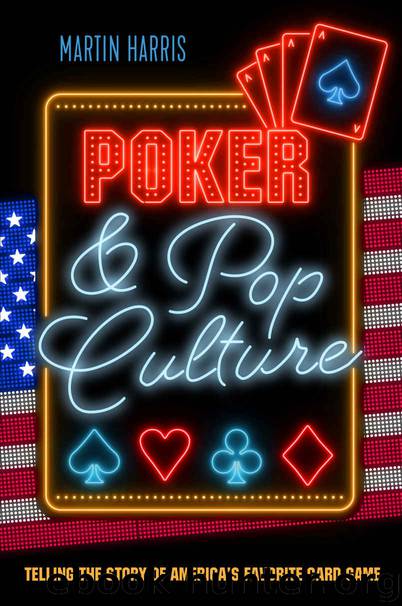Poker & Pop Culture: Telling the Story of America's Favorite Card Game by Martin Harris

Author:Martin Harris [Harris, Martin]
Language: eng
Format: azw
ISBN: 9781912862009
Publisher: D&B Publishing
Published: 2019-06-22T16:00:00+00:00
News and Sports Magazines
The most successful and influential news magazine of the 20th century was Time, started in 1923 and also originally part of the Henry Luce media empire. For much of the magazine’s run poker only came up by way of analogy with politics, business, and international affairs, though Time has occasionally looked in on the game. In 1986 the magazine reported on poker professional Billy Baxter’s victory in his lawsuit against the U.S. government from which he was awarded a $178,000 refund from the Internal Revenue Service. The IRS had tried to tax Baxter’s gambling winnings (via poker) over a four-year span at the higher rate applied to dividends and interest, and not as though they were earned income. Baxter filed a suit, “contending that his winnings were the product of skill and hard work,” and a U.S. district court in Nevada agreed. “Jack Nicklaus gets to file his prize money as earned income. Why not me?” Baxter said.30
Later came occasional reports from the Main Event, such “The Big Poker Freeze-Out” reporting Iranian-born Brit Mansour Matloubi’s Main Event win in 1990, his participation helping demonstrate “Poker may be the most successful U.S. export.”31 In 2005, Francine Russo reported on the increased involvement of women in poker, particularly online and “away from the testosterone-fueled aggressiveness often aimed at women in casinos.”32 And a 2010 article reporting on the “Attack of the Math Brats” examines online poker’s effect on tournament strategy, sketching in broad strokes a contrast between an older generation used to live poker and younger players weaned online. The conflict is generalized as the “old school” versus the “new math,” with the latter’s use of statistical data gathered from online play informing ostensibly unorthodox approaches. Meanwhile established players express doubts and hire a “mind-set coach” to help dispel “negative thought,” an anti-math gesture meant to suggest the divide between the two camps to have been much wider than was actually the case.33
Time’s primary competitor in the weekly news market has traditionally been the appropriately named Newsweek, which first appeared in 1933. Few references to poker appear in Newsweek’s pages for much of its early run, although the magazine reported from the World Series of Poker from time to time. Sports writer Pete Axthelm went to the WSOP in 1979 and wrote admiringly of the pros.34 Responding to David Hayano’s book Poker Faces, Walter Goodman reflected both on poker’s appeal and the Gardena poker rooms in 1982 in a piece titled “Poker as a Way of Life.” While expressing measured skepticism of Hayano’s academic approach to the Gardena “professionals,” Goodman nonetheless finds the scene similarly intriguing while also recognizing the “prime appeal of the game is the testing of the qualities that are rarely exercised in the daily round.” He seems to empathize with the players’ hope to find an alternative to “punching in at some routine 40-hour-a-week job.”35 Newsweek wasn’t so enamored by the poker in Rounders, however, and its scathing 1998 review, titled “The Bottom of the Deck,” concluded: “Watching it is about as exciting as playing poker with all the cards face up.
Download
This site does not store any files on its server. We only index and link to content provided by other sites. Please contact the content providers to delete copyright contents if any and email us, we'll remove relevant links or contents immediately.
Harry Potter and the Cursed Child: The Journey by Harry Potter Theatrical Productions(3955)
The Sports Rules Book by Human Kinetics(3582)
Molly's Game: From Hollywood's Elite to Wall Street's Billionaire Boys Club, My High-Stakes Adventure in the World of Underground Poker by Molly Bloom(2962)
A Knight of the Seven Kingdoms by George R R Martin(2620)
Quidditch Through the Ages by J.K. Rowling(2567)
Quidditch Through the Ages by J K Rowling & Kennilworthy Whisp(2557)
How To by Randall Munroe(2466)
Quidditch Through the Ages by Kennilworthy Whisp by J.K. Rowling(2404)
Quidditch through the Ages by J. K. Rowling(2351)
Quidditch Through The Ages by J. K. Rowling(2314)
Stacked Decks by The Rotenberg Collection(2267)
776 Stupidest Things Ever Said by Ross Petras(2264)
What If?: Serious Scientific Answers to Absurd Hypothetical Questions by Randall Munroe(2166)
Flowers For Algernon by Daniel Keyes(2153)
The Infinite Retina by Robert Scoble Irena Cronin(2139)
Beautiful Oblivion by Jamie McGuire(2136)
The Book of Questions: Revised and Updated by Gregory Stock Ph.d(2136)
Champions of Illusion by Susana Martinez-Conde & Stephen Macknik(2073)
Ready Player One: A Novel by Ernest Cline(2071)
